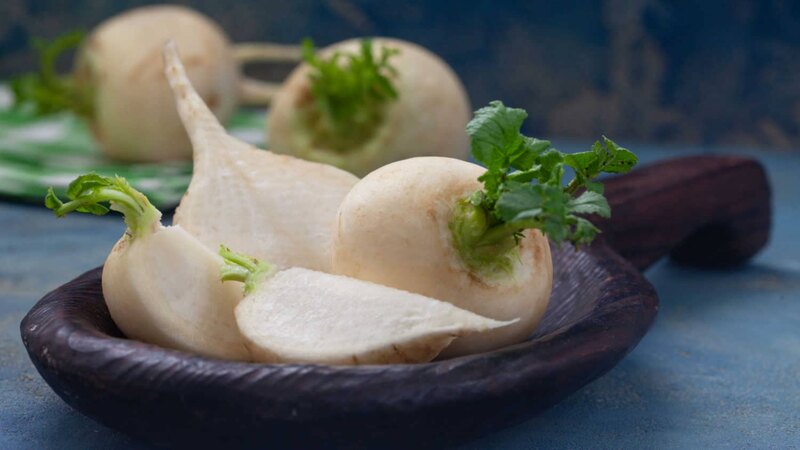
If you’ve begun introducing veggies as solid foods to your infant, you’ve probably already compiled a list of vegetables to buy. Here is a tip! Shall we ask you to add turnips also to the list? You will thank us later because turnips are an essential nutrient-dense root vegetable for your baby’s development and growth. Read on to learn how you can introduce turnips for babies.
Turnips, a root vegetable, are commonly included in diets around the world as an important component of nutritional health. Their high fiber and vitamin content help to keep infants healthy and active. Turnips contain nitrates and nitrites, which has raised concerns about their safety for consumption. Continue reading to discover about the possible benefits and downsides of turnips for babies.
What Are Turnips?
Turnip is a root vegetable grown in temperate locations. Turnip roots are commonly used in salads, curries, pickles, and a variety of other Indian dishes. However, you should be aware that turnip greens are more nutritious than roots and have a higher concentration of nutrients, antioxidants, vitamins, and minerals. Turnip greens are also more versatile.
When to Introduce Turnips For Babies?
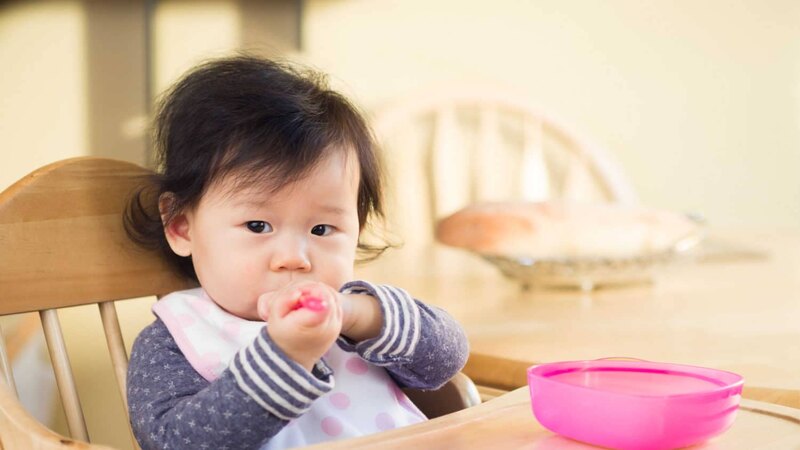
Once your baby gets used to eating semi-solid as well as solid foods such as potatoes, sweet potatoes, beetroot, and carrots, you can offer turnips to him. Turnips, both boiled and mashed, are popular with babies. If you intend to begin weaning your infant, consult your pediatrician first to ensure that the timing is correct.
Nine months onwards is an appropriate age to start feeding this tuber to your infant using a variety of cooking ways, including boiled, roasted, steamed, and stir-fried (1). Add turnips to homemade vegetable soups. Puree them as an alternative to mashed potatoes. It contains important nutrients, dietary fiber, and other beneficial components to keep them healthy.
Nutritional Value of Turnips
Turnips have an abundance of vitamin C, sodium, potassium, and calcium. This vegetable is also an excellent source of dietary fiber for infants.
The table below lists the nutritional value per 1 bulb peeled (12.6 g) of turnips (2<).
| Nutrient | Quantity |
| Total Carbs | 4.5 g |
| Dietary Fiber | 1 g |
| Protein | 0.33 g |
| Vitamin C | 0.7 mg |
| Calcium | 16.4 |
| Iron | 0.16 mg |
| Sodium | 0.63 mg |
| Potassium | 19.66 mg |
| Folate | 1.26 mcg |
How To Select And Store Turnips For Babies?
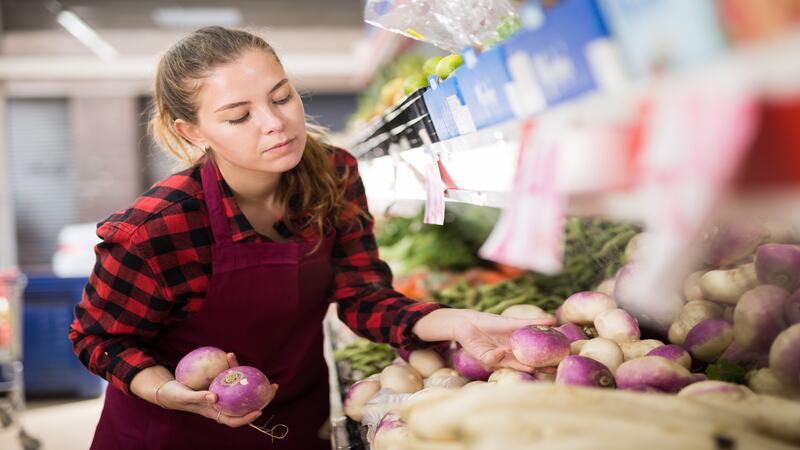
Turnip is not among the top twelve pesticide-contaminated foods. However, contamination is possible, so organic turnips are preferred. Furthermore, by following these basic steps, you can protect your baby.
Selecting Turnips
- Visit your local vegetable market and look for fresh baby turnips that are small, round, and heavy for their size. These baby turnips are sweeter than larger turnips, which can have a sharp taste that your infant may reject.
- Look for turnips with vibrant, fresh greens.
- Avoid turnips that are broken, bruised, or have soft areas since they won’t keep well.
Note: In case you get a slightly large turnip, and if you are worried about its bitterness, here comes a remedy. Boil it with potato slices. Potato slices will absorb the bitterness of the turnip to a great extent.
Storing Turnips
Wrap the turnips tightly and keep them in a cool and well-ventilated place.
How To Introduce Turnips For Babies?
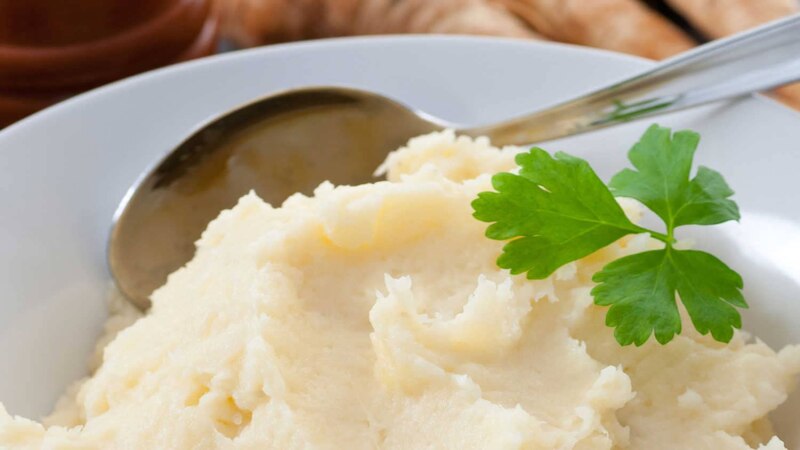
First of all, check with your pediatrician if your baby is ready to be introduced to vegetables such as turnips. Once he gives you a green signal, start with turnip puree.
Preparing Puree
Wash the turnips under cold running water and peel off the skins. You can pressure cook the turnips with water or steam them. Once it cools down you can blend them into a puree as per your preferred consistency. Start by giving small bites to your baby.
Once your baby adapts to the taste of the turnips you can slowly introduce it into other solid food preparations as well.
Although you may not enjoy eating this root vegetable yourself, be rest assured that it is actually super food for your body. Do consult with your doctor first and introduce this healthy vegetable into your baby’s everyday diet to make it packed with nutrients.
When To Introduce Turnips For Babies?
Once your baby is 6 months old, you can start introducing pureed or mashed roots, leafy greens, and other vegetables into their diet. Turnips can be offered to your baby starting at 9 months. This root vegetable is high in nutrients and contributes to your baby’s healthy development (3).
Top 9 Health Benefits of Turnips For Babies
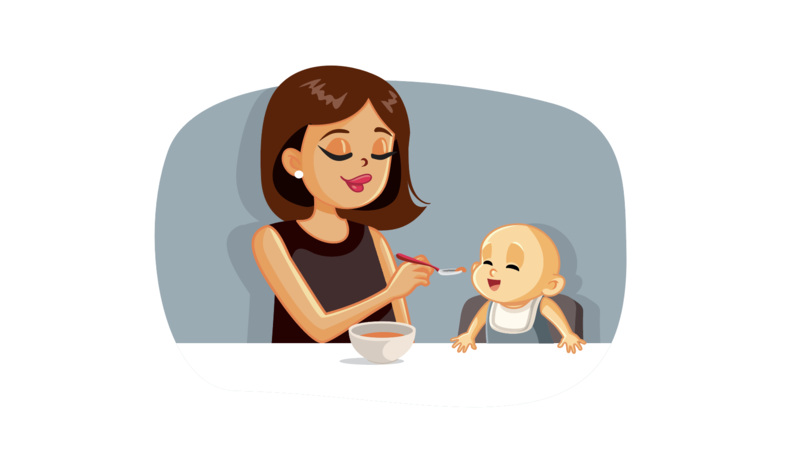
Turnips can be introduced to babies at the age of 9 months. As discussed before, turnips are packed with nutrients that are important for your baby’s growth and development.
Here are some of the benefits of turnips for babies.
1. Aid in Bowel Regulation
Turnips are high in fiber content which plays a key role in regulating bowel movement. Babies who have just started solids have a higher chance of developing constipation. Foods like turnips help reduce constipation and regulate bowel movement in babies.
2. Boost Immunity
The vitamin C present in turnips will help to build the baby’s immune system and also to absorb iron from the food. Babies have an immature immune system and have a higher chance of falling ill. Feeding them with vegetables such as turnips helps boost their immunity and keep them healthy.
3. Aid in Brain Development
The rich iron content and traces of zinc in turnip will help to develop your baby’s brain.
4. Enhance Iron Absorption
As they are a good source of iron, turnips help with RBC formation and thereby improve your baby’s blood circulation. This is very important for the overall development of the baby.
5. Promote Bone Growth
Fresh greens and turnip roots provide a variety of nutrients, including vitamin K, copper, manganese, and calcium, all of which are beneficial to babies’ muscles and bones.
6. Possess Anti-Inflammatory Properties
Turnips have anti-inflammatory properties which can keep a baby healthy and free from various types of illnesses and sicknesses in the long run. This is one of the top benefits of turnips for babies.
7. Rich In Antioxidants
Turnips are high in vitamin C, fiber, and antioxidants, which benefit the immunity, digestive, and cardiovascular systems. These substances assist protect your babies by improving their general health throughout this rapid growth period.
8. Promotes Liver Function
Turnip has a good effect on the liver health of babies since it contains bioactive elements, including peroxidase, kaempferol, sulforaphane, and glucosinolates (4).
9. Supports Renal Function
Turnip is a kidney-friendly food for babies due to its high content of phenolic compounds, flavonoids, and organic acids (5).
Can Turnips Cause Any Health Concerns For My Baby?

Even though not that common, turnips can bring about certain side effects. Therefore, make sure to follow the four-day rule (continue feeding the same (new) food for four days. Only one new food to be introduced at a time) when you introduce turnips to your baby. This will help you to find out how your baby’s body reacts to this new food.
1. Gas
If your baby becomes cranky and starts to cry inconsolably after feeding the turnip, most probably it will be due to gas formation in your baby’s stomach. This can disturb the baby’s appetite as well. Your baby might suddenly begin to cry as she might be experiencing discomfort in her stomach.
When you introduce turnips to your baby, just give little amounts for a day or two and see how your baby reacts to the vegetable. In case there is no discomfort, then you may continue to feed turnips to your baby. But if you notice any signs of discomfort after feeding turnips, discontinue immediately and check once with your doctor regarding the same.
2. Allergy
A baby can contract turnip allergy, although it is rare. If your baby develops a runny nose, sneezing, itching, or coughing right after being introduced to turnip, it can be a sign of turnip allergy. Keep this in mind before introducing turnips for babies.
Turnips are indeed a great source of various nutrients for your baby. But if you have any family history of food allergies, there are chances your baby has it too. So ensure you speak to your baby’s pediatrician and introduce new foods in a slow-paced manner. Some of the symptoms of illness that your baby may show if she is allergic to turnips are cough, itching, sneezing, and running nose. If you notice any of the above symptoms kindly get your baby consulted with your doctor.
Precautions When Introducing Turnips For Babies
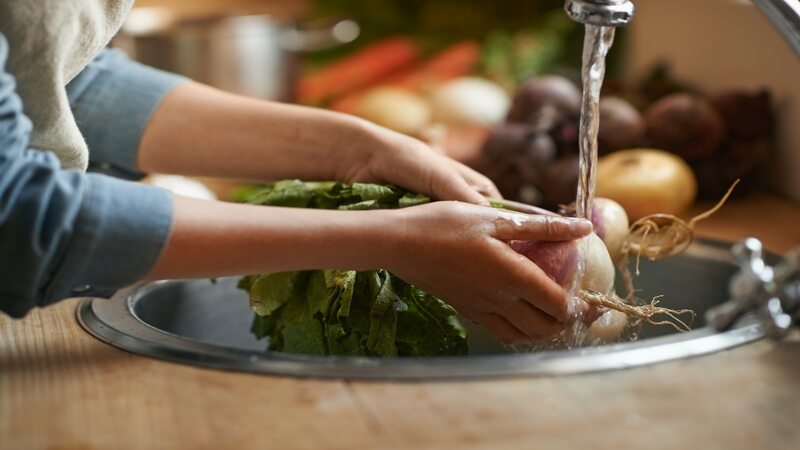
Both store-bought and homemade vegetable-based infant foods are an important source of adequate calories and basic nutrients such as vitamins, dietary fiber, and minerals for babies aged 6 months to 2 years (6). When introducing turnips to your baby, there are a few precautions you can take to ensure that they do not hurt your baby in any way.
Let’s talk about them in depth below:
- Try to provide a variety of turnip-based recipes with different flavors and textures while keeping the sugar content low (7).
- Do not offer your baby small chopped turnips because they can cause choking.
- Serve big fragments of cooked turnips for the baby to hold onto and self-feed.
- Choose steamed turnips over raw turnips, to tone down the strong flavor for your baby.
- Keep an eye out for any responses or negative effects that your baby may experience after eating turnips.
FAQ’s
1. Will Turnip Make my Baby Gassy?
Turnip in babies can cause the formation of gas. If your baby starts getting cranky after eating turnips, then the formation of gas could be the root cause.
2. Does Turnip Cause Constipation in Babies?
Turnip does not cause constipation in babies. On the other hand, the high fiber content present in turnips can relieve constipation and regularize bowel movements.
3. At What Age Can I Start Giving Turnips For Babies?
Turnips can be offered to your baby starting at 9 months. By now, your infant is familiar with different pureed or mashed vegetables.
Reference
- Nor, N.D.M.; Mullick, H.; Zhou, X.; Oloyede, O.; Houston-Price, C.; Harvey, K.; Methven, L. Consumer Liking of Turnip Cooked by Different Methods: The Influence of Sensory Profile and Consumer Bitter Taste Genotype. Foods 2023, 12, 3188 – https://doi.org/10.3390/foods12173188
- Prairie Turnips, raw (Northern Plains Indians) – https://www.nutritionvalue.org/Prairie_Turnips%2C_raw_%28Northern_Plains_Indians%29_nutritional_value.html
- Knez E, Kadac-Czapska K, Dmochowska-Ślęzak K, Grembecka M. Root Vegetables-Composition, Health Effects, and Contaminants. Int J Environ Res Public Health. 2022 Nov 23;19(23):15531 – https://www.ncbi.nlm.nih.gov/pmc/articles/PMC9735862/
- Javed, A., Ahmad, A., Nouman, M., Hameed, A., Tahir, A., & Shabbir, U. (2019). Turnip (Brassica RapusL.): a natural health tonic. Brazilian Journal of Food Technology, 22, e2018253 – 10.1590/1981-6723.25318
- Cao Q, Wang G, Peng Y. A Critical Review on Phytochemical Profile and Biological Effects of Turnip (Brassica rapa L.). Front Nutr. 2021 Jul 29;8:721733 – https://pubmed.ncbi.nlm.nih.gov/34395503/
- Mateescu, A.M.; Mureșan, A.E.; Pușcaș, A.; Mureșan, V.; Sestras, R.E.; Muste, S. Baby Food Purees Obtained from Ten Different Apple Cultivars and Vegetable Mixtures: Product Development and Quality Control. Appl. Sci. 2022, 12, 12462 – https://www.mdpi.com/2076-3417/12/23/12462
- Koletzko B, Bührer C, Ensenauer R, Jochum F, Kalhoff H, Lawrenz B, Körner A, Mihatsch W, Rudloff S, Zimmer KP. Complementary foods in baby food pouches: position statement from the Nutrition Commission of the German Society for Pediatrics and Adolescent Medicine (DGKJ, e.V.). Mol Cell Pediatr. 2019 Mar 6;6(1):2 – https://www.ncbi.nlm.nih.gov/pmc/articles/PMC6403273/
